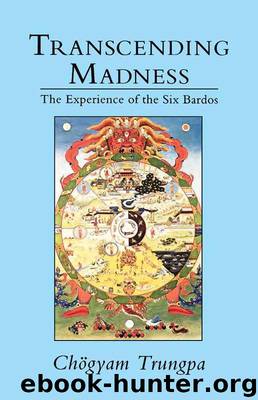Transcending Madness: The Experience of the Six Bardos (Dharma Ocean Series) by Trungpa Chogyam

Author:Trungpa, Chogyam [Trungpa, Chogyam]
Language: eng
Format: azw3, epub
Publisher: Shambhala Publications
Published: 2010-09-28T03:00:00+00:00
NINE
The Lonely Journey
SINCE THIS PARTICULAR SESSION is going to be the last one, I think we should try to develop further perspective, or view, as to what we have discussed and its application to everyday life. Of course, everyone must go through different phases of so-called normality and so-called abnormality, such as tension, depression, happiness, and spirituality. All these phases that we go through constantly seem to be what we have been talking about in this seminar. Unless we are able to apply this to everyday life, there is no point to it. Often, before we begin to apply it to anything, certain reminders come up to show us whether we are going too fast or going too slow. I’m not talking in terms of divine power or psychic phenomena of any kind, but the kitchen-sink level—conflicts of the bedroom and conflicts of the sink. Such situations are always present, but on the other hand we are left completely alone—without help, without a sympathizer, without a comforter.
It is important to see that this journey is a lonely journey. We are alone, completely alone, by ourselves. Nobody is really, fundamentally, going to comfort us at all. For that matter, nobody is really going to show us the path. There are a lot of big deals. People make a big deal about transmission or sudden enlightenment—but even that is interdependent. Transmission is a meeting of two minds: you come halfway, the teacher comes halfway, and you meet. It is very much dependent on personal effort. So any kind of savior notion is not going to function one hundred percent at all. Transmission has to be interdependent because we are trying to relate with something. As soon as we decide to relate with anything, there has to be judgment, relative criteria: how we are going to relate, how open we are, how much ground we are allowing to relate to the space. That is always apparent, it always happens that way.
In the same way, as we relate more, external situations come to us. We begin to learn; we begin to receive the instructions of the situation as it is. But we can’t re-create such situations at all. Situations come up and vanish of their own accord, and we have to work along with them by not grasping, by not being fascinated by them. That doesn’t mean that we have to be frigid, or rigid for that matter, and fail to communicate with situations. It seems that the whole thing is extremely simple. Therefore, it is too complicated to get into it by using the language of the mind of complications, the logic of that and this, this and that, “On the other hand, let’s look at it that way,” and so on. The reason we are suffering is that we are so involved with strategy or planning rather than actually putting this into practice as it is.
This whole series of situations, the six types of bardo experience, is present all the time. There is the domestic problem of the hungry ghosts, in terms of comfort, luxury, hunger, and thirst.
Download
Transcending Madness: The Experience of the Six Bardos (Dharma Ocean Series) by Trungpa Chogyam.epub
This site does not store any files on its server. We only index and link to content provided by other sites. Please contact the content providers to delete copyright contents if any and email us, we'll remove relevant links or contents immediately.
The Way of Zen by Alan W. Watts(6578)
Ego Is the Enemy by Ryan Holiday(5392)
The Art of Happiness by The Dalai Lama(4116)
The Book of Joy by Dalai Lama(3961)
Why Buddhism is True by Robert Wright(3434)
Spark Joy by Marie Kondo(3284)
Shift into Freedom by Loch Kelly(3183)
Happiness by Matthieu Ricard(3031)
A Monk's Guide to a Clean House and Mind by Shoukei Matsumoto(2897)
The Lost Art of Good Conversation by Sakyong Mipham(2637)
The Meaning of the Library by unknow(2552)
The Unfettered Mind: Writings from a Zen Master to a Master Swordsman by Takuan Soho(2288)
The Third Eye by T. Lobsang Rampa(2249)
Anthology by T J(2195)
Red Shambhala by Andrei Znamenski(2176)
The Diamond Cutter by Geshe Michael Roach(2054)
Thoughts Without A Thinker: Psychotherapy from a Buddhist Perspective by Epstein Mark(2001)
Twilight of Idols and Anti-Christ by Friedrich Nietzsche(1884)
Advice Not Given by Mark Epstein(1869)
